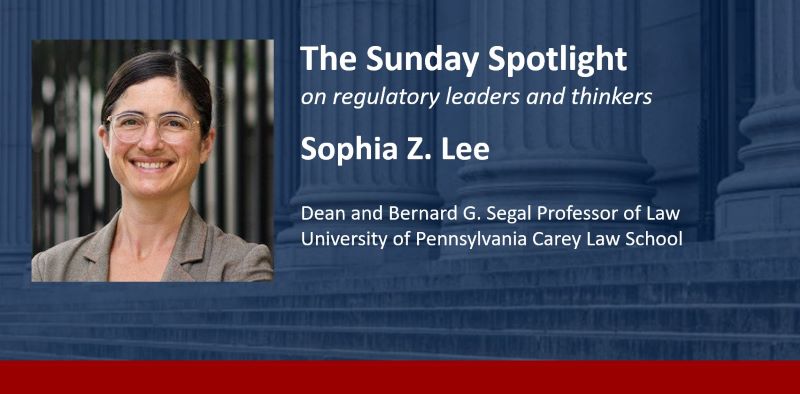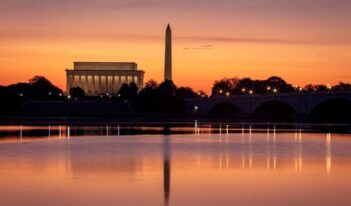
Dean Sophia Z. Lee discusses her scholarship in administrative law and shares her advice with law students and future scholars.
In an interview with The Regulatory Review, Sophia Z. Lee, Dean of the University of Pennsylvania Carey Law School, discusses common themes in her work as a legal scholar and historian of administrative law. Lee discusses the importance of analyzing legal developments in their historical contexts and the crucial intersection between administrative law and racial justice movements. Lee also offers insight and advice to budding scholars of regulation and her plans for the future of Penn Carey Law.
In addition to serving as dean of Penn Carey Law since 2023, Lee is the Bernard G. Segal Professor of Law and has a secondary appointment in the history department of the University of Pennsylvania. Lee has been a part of the law school community since joining as an assistant professor of law in 2009 and served as deputy dean from 2015 to 2017. In addition to her leadership at the law school, Lee has also served in leadership capacities within the Labor and Working Class History Association and the American Society for Legal History.
Prior to coming to the University of Pennsylvania, Lee was a Samuel I. Golieb Fellow at New York University School of Law and clerked for the Honorable Kimba M. Wood of the U.S. District Court for the Southern District of New York. Lee earned both her undergraduate and master’s degree at the University of California, Berkeley and pursued a career in social work before earning a J.D. and Ph.D. in history from Yale University.
The Regulatory Review is pleased to share the following interview with Dean Sophia Z. Lee.
The Regulatory Review: As a legal scholar, you have combined your background as a lawyer and a historian throughout your scholarship. Could you describe some of the main themes of your scholarship?
There are two themes that are most relevant for The Regulatory Review’s audience. The first is administrative constitutionalism. In the early 2000s, legal scholars were paying renewed attention to the role non-court actors play in making constitutional law. They had written about the roles the public, the president, and Congress played. My work expanded the inquiry to include the work of administrative agencies in the interpretation and implementation of the U.S. Constitution. Using history, I showed that agencies had been far more influential and innovative interpreters of the Constitution than assumed.
The other theme of my work has been demonstrating the important relationship between administrative law and racial justice movements. My scholarship has emphasized how including advocacy before administrative agencies changes our understanding of the civil rights movement. For instance, I’ve shown that civil rights advocates did not abandon economic justice issues in the 1950s, as was previously assumed, but instead migrated many of those claims from the courts to administrative agencies. My work has also highlighted the influence racial justice advocates have had on administrative law. As civil rights advocates pursued administrative strategies, they raised novel issues that helped shape the course of administrative law for all parties.
TRR: One of your areas of expertise lies in administrative law. How is history relevant to contemporary discussions in administrative law, whether in practice or in scholarship?
History has always been relevant to administrative law and is only more so today. History has long shed useful light on how current law came to be, helped us think about legal alternatives, and provided ideas for how to effectuate changes in the law. History has also traditionally played an important role in analyzing the structural constitutional issues that are core to administrative law and the architecture of the administrative state. History is only more essential today given the rise of originalism and more historically grounded approaches to interpretation not only of constitutional law, but also of the Administrative Procedure Act. These days, some of the hottest debates in administrative law involve historical questions.
TRR: For many years, you organized an essay contest for students in your Administrative Law class. The winners have had their essays published in The Regulatory Review. As an educator, what have you found valuable about The Review?
The Regulatory Review is a great resource in the classroom. First, it’s an excellent source for accessible and timely reporting that can demonstrate the real-world stakes of the doctrine we’re learning. I would frequently share relevant articles in class. Those pieces also provided good models for students of how to write clearly and accessibly about regulation and administrative law, which is an evermore important professional skill. That’s why I’ve been so thankful to The Regulatory Review for partnering with me on my essay contests. Every semester, small groups of students studied a single regulation. Next, each student wrote a Regulatory Review-style essay about that regulation, which helped them develop their ability to write clearly about this challenging subject. That The Regulatory Review committed to publishing at least one of the student essays each year gave the contest some real-world stakes and, for at least one student, the reward of a publication. The contest also meant that my students finished their first year of law school very familiar with The Regulatory Review, and many of them were excited to join its ranks.
TRR: You have recently become the dean of Penn Carey Law. What are some of the opportunities that you see for the law school in the coming years?
There are many things I am excited about, but perhaps most relevant to readers of The Regulatory Review, I’m looking forward to continuing to strengthen opportunities for our students and graduates interested in regulatory law and policy.
TRR: What advice would you give law students today who are interested in careers involving administrative or regulatory law?
Take Administrative Law and our other regulatory law classes, join The Regulatory Review, and consider one of the many administrative law-related experiential opportunities the law school offers. Clerking can be excellent preparation for these careers as well. Also, seek opportunities to connect with our alumni working in this area. They have served at the highest levels in government, pursued fulfilling careers in agencies, and built important and influential private regulatory practices. They can be an excellent source of advice and inspiration. By that same measure, once you’ve established yourself, please remember to pay it forward to future Penn Carey Law students!
The Sunday Spotlight is a recurring feature of The Regulatory Review that periodically shares conversations with leaders and thinkers in the field of regulation and, in doing so, shines a light on important regulatory topics and ideas.



